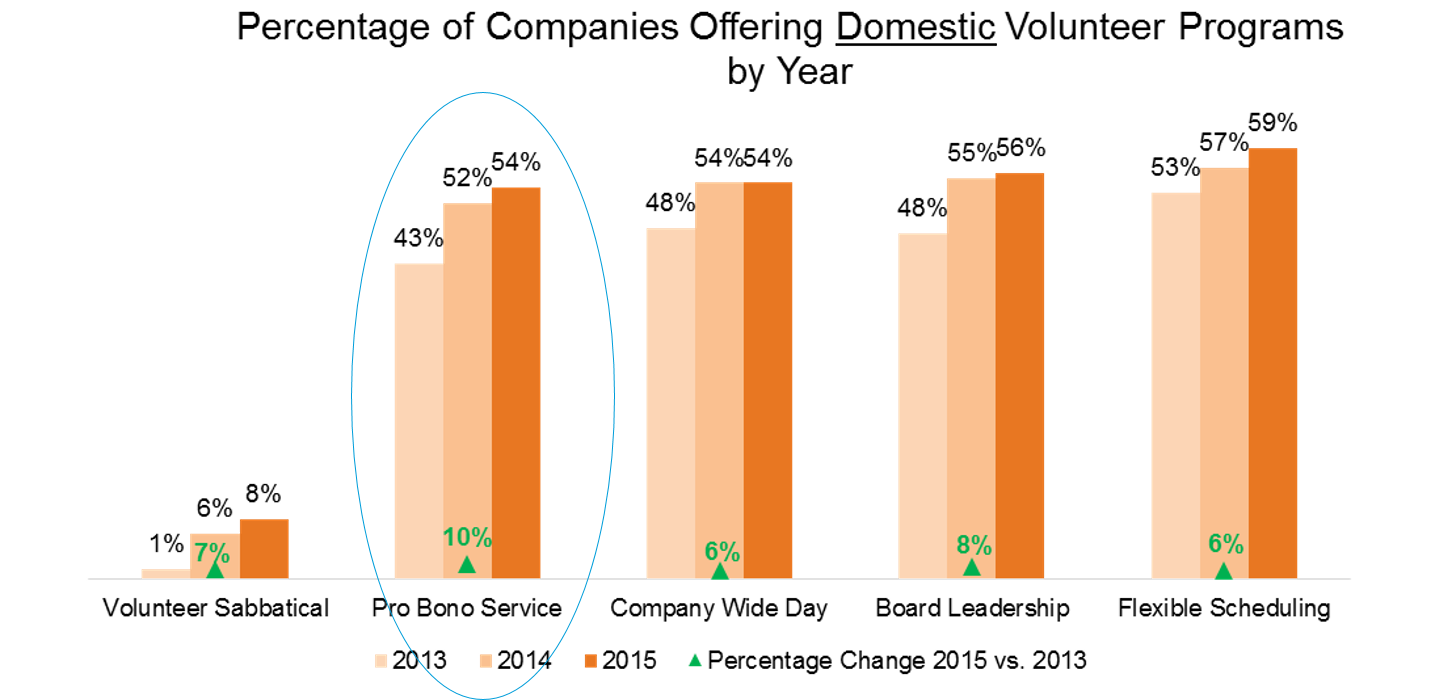October 27, 2016–Did you know, that pro bono service is the fastest growing domestic volunteer program among leading global companies in the last three years? According to CECP’s report on trends in corporate societal engagement, Giving in Numbers: 2016 Edition, the percentage of companies offering pro bono services in the US increased from 43% in 2013 to 54% in 2015. What’s more, CECP’s report on international corporate giving – Giving Around the Globe – also found an uptick in this skills-based volunteering practice with global companies reporting a rise in pro bono opportunities from 17% to 24%.
Why are companies embracing pro bono service so wholeheartedly? At CECP, we’ve heard from our companies that offering pro bono services can significantly amplify their corporate societal engagement impact simultaneously in the community and in the business. Employees want a break from the norm and a way to demonstrate their values and passions through the work. Pro bono offers a way for employees, through their companies, to make deep connections with community partners.
Offering a skills-based volunteering opportunity to your employees is an ideal way to develop their leadership skills and create a stronger sense of purpose, among other benefits. Companies that offer pro bono service are infusing a strong corporate culture into their long-term strategy and reinforcing it with the right incentives.
In 2015 alone, more than half of all companies surveyed by CECP for the Giving in Numbers report offered pro bono service programs. Within their non-cash contributions, the Technology and Financials industries offered pro bono services at a higher proportion than other industries.
Pro Bono in Practice
IBM
IBM is one company that has seen global success with its pro bono service program via the Corporate Service Corps (CSC), and in partnership with PYXERA. Launched in 2008, the CSC sends high achieving IBM employees to perform community-driven economic development projects in Africa, Asia, Eastern Europe and Latin America, working at the intersection of business, technology and society. PYXERA worked with IBM to identify communities best positioned to receive IBM pro bono support and an equally strong need for technical assistance. IBM employees submit to a competitive application process to create teams from offices around the work and ultimately spend up to four weeks in an emerging or frontier economy working on assignment with a government agency, small or medium enterprise, economic institution, or a local organization.
The results? IBM says that 90% of CSC alumni reported that the program increased their leadership skills, while 82% said it increased their desire to continue their career at IBM. In a survey of managers of CSC alumni, 64% said the employee is now contributing in more valuable ways. IBM’s program has provided at least $65 million in pro bono consulting services for host organizations over a five-year period and positively impacted the lives of at least 140,000 people directly and hundreds of thousands more indirectly through projects in the areas of education and healthcare. Plus, IBM says that the cost to send fifteen people on a one-month assignment is minimal compared to the cost of an individual placed on a one-year expatriate program.
To date, 2,400 participants have served on 850 projects in over 35 countries, helping IBM deepen its relationships and understand market conditions in emerging markets worldwide.
But what if your company isn’t a global powerhouse and not quite ready to send teams into developing nations? Pro bono works at a small(er) scale too.
Best Buy
In 2007, electronics store Best Buy launched Geek Squad Academy, offering Geek Squad Agents and Best Buy “Blue Shirts” the chance to teach teens critical tech skills that will inspire future education and career choices. To accomplish this, Geek Squad Academy partners with local non-profits and other organizations to expose students ages 10-18 to the latest technology in a fun, interactive setting. The program is now in its tenth season, with eight Best Buy Teen Tech Centers and dozens of Geek Squad Academy events in 29 cities during summer 2016.
Nielsen
At Nielsen Holdings, a global information and measurement company, associates use their skills and mobilize Nielsen’s data and expertise for good, helping to solve some of the world’s biggest social challenges. Nielsen Cares offers projects that include the donation of Nielsen data and insights, as well as employees’ time, skills and expertise, and are aimed at helping nonprofits to maximize their impact, build capacity, and improve their effectiveness and efficiency.
Among the efforts Nielsen has been involved with was working alongside the World Food Programme to modernize their food vulnerability surveys with mobile capabilities. Other projects include collaborating with Feeding America on Map the Meal Gap to estimate food insecurity at the U.S. county level, and working with Special Olympics to quantify the consumer power of households with intellectual disabilities.
Since 2012, Nielsen has pledged at least $10 million each year through pro bono and in-kind contributions. In 2015, Nielsen donated $10.5 million through skills-based volunteering projects and in-kind giving to benefit nonprofits in their priority cause areas (Hunger & Nutrition, Education, Diversity & Inclusion, Technology).
Looking to start or ramp up your company’s pro bono services? While considering what the right opportunity is for your company’s employees remember that pro bono service must meet three criteria:
1) There is a formal written commitment;
2) Employee is performing their professional function; and
3) The commitment is made to an end-recipient that is formally organized, has a charitable purpose, and never distributes profits.
What’s the best way to find a nonprofit or community-based organization that will truly benefit from your company’s skills and talents? Team up with specialized regional nonprofits that have deep knowledge of how to engage skills-based employee volunteers effectively.
CECP partnered with The Taproot Foundation, a leading organization connecting nonprofits with skilled volunteers who share their expertise pro bono, to develop a guide to valuing pro bono service that companies will find useful. In 2015, a dollar value of $150 was set to reflect average, national hourly rates of pay, adjusted for consulting, for multiple professions across three levels of experience.
Most organizations tackling social problems don’t have access to the marketing, design, technology, management, or strategic planning resources they need to succeed. Without this talent, few are able to have their intended impact on critical issues like the environment, health, and education. The role of business has always been to meet unmet needs, and in these days of heightened societal and economic challenges, pro bono service make sense for society and business—particularly employees who want to invest in communities through their work.


